Dónal O’Driscoll, June 2019
In 2009 blacklisting organisation The Consulting Association was raided. The files seized revealed the considerable extent to which blacklisting of trade union and left wing political activists was being conducted by the construction industry. As some of the people whose files were recovered examined the material more closely, they realised some of it could only have come from the police.
In April 2012, the Blacklist Support Group submitted a formal complaint to the Metropolitan Police alleging collusion between Special Branch and construction companies. The investigation this triggered was called Operation Reuben, and though its final report was completed in 2014, it took another four years before a redacted version was provided to the Blacklist Support Group.
Background to the report
For much of the 20th century, the construction industry ran schemes to blacklist trade unionists fighting for basic health and safety and a decent pay. Thousands of builders were kept from work and placed in considerable financial hardship. The most pernicious of these schemes was run by a private industry body called the Economic League, funded by the largest construction companies in the UK. With the active participation of the directors of the building firms, it and its successor organisation, The Consulting Association, collated information on workers to put together an extensive and illegal blacklist.
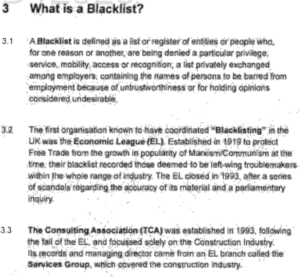
The construction industry blacklist is only one of a number of such illegal schemes where workers were prevented for taking up jobs because of union or political activism. It should be seen as part of a larger programme of vetting, where by police and security services regularly met and colluded with industry bodies and leaders to curtail employment rights, often in the name of anti-communism or national security.
An exposé in The Guardian in 2008[1]Phil Chamberlain, Enemy at the gates, The Guardian, 28 June 2008. led to the Information Commissioner’s Office raiding The Consulting Association a year later and seizing its blacklist, along with a number of the associated personal files. There were 3,216 names on the list and approximate 200 names on the so-called ‘green list’ of environmental and other campaigners.[2]Matthew Taylor, Blacklist used by construction firms to disrupt environmental protests, The Guardian, 28 January 2013. Court cases have followed with an industry compensation scheme providing significant settlements to many.[3]Construction firms strike blacklisting settlement, BBC Online, 29 April 2019.[4]Alan Jones, Blacklisted construction workers get compensation, The Independent, 9 May 2019.
Through the Information Commissioner’s Office, blacklisted workers were able to examine their files. As a result, a number of them grew suspicious that material in them could only have come from police.
None of this was particularly new: illegal vetting by the Economic League and their collaboration with the Security Service had been known for many years.[5]In the year leading up to the second world war, MI5 was secretly vetting 25,000 workers a month. However, this was not aimed at Nazi sympathisers but working class communists. The National Archives, Cabinet Office 116/37, Lord Swinton to Service Supply Departments, July 10, 1940, cited in Jennifer Luff, Covert and Overt Operations: Interwar Political Policing in the United States and the United Kingdom, June 2017. Likewise, it was long known that Special Branch and MI5 had monitored industrial disputes. In 1988, journalists Mark Hollingsworth and Richard Norton-Taylor wrote how much of blacklisting and vetting was being done illegally and with open complicity by police, including the sharing of Special Branch files.[6]Mark Hollingsworth & Richard Norton-Taylor, Blacklist: The inside story of political vetting, Hogart Press, 1988. While in 2002 the BBC series True Spies had former Special Branch agents talking about infiltrating unions.[7]Eveline Lubbers, True Spies – Story, SpecialBranchFiles.uk, 24 March 2016. Links to video and transcripts of the TV series.
Those suspicions deepened when the undercover policing scandal broke. Firstly, in 2009 former undercover Peter Francis came forward to talk about how he had spied on trade unionists in the 1990s.
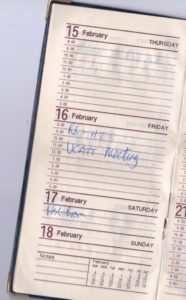
Several years later it was revealed that another undercover Mark Jenner, as Mark Cassidy had infiltrated the Colin Roach Centre, anti-fascists and social justice groups in north London from 1995 to 2000.[8]Peter Salmon & Eveline Lubbers, Mark Jenner (profile), Undercover Research Group (powerbase.info), 2014-2016. He was also involved in trade union activism, focusing on construction union UCATT, where he attended meetings and pickets. Notably, a number of people he was close to were on The Consulting Association blacklist.
Both Francis and Jenner were part of the highly secretive unit within the Metropolitan Police Special Branch (MPSB) called the Special Demonstration Squad (SDS). From 1968 to 2008, it deployed undercovers into a variety of left-wing parties, Irish solidarity groups and a variety of social justice campaigns.
Material from the SDS, once sanitized as to the origin, was passed on to MPSB’s ‘C Desk’ (or C Squad), which dealt with counter-subversion (these days called ‘domestic extremism’). There the data was combined with material from other sources to provide reports on protestor activity to the rest of police. ‘C Desk’ also disseminated information to other agencies such as the security services, and seemingly had links with private firms as well – the information flow going both ways.
The closer the construction workers examined their files, the more they grew concerned that particular material in those files had not just come from Special Branch but had actually originated in undercovers such as Francis and Jenner.[9]Dave Smith & Phil Chamberlain, Blacklisted: The secret war between big business and union activists, New Internationalist, 2nd Edition, September 2016.
The complaints
Following the discovery of the blacklist, the trade union backed Blacklist Support Group was established to pursue various avenues for justice.
In April 2012, following a request by the MP of one blacklisted worker, the Metropolitan Police did a cursory investigation into the issue and swept it under the carpet (see Operation Creel below). This led to solicitors for victims of blacklisting lodging a complaint with the Independent Police Complaints Commission (since rebranded the Independent Office for Police Conduct) in November 2012, alleging that police officers were complicit in supplying information on workers to blacklisting organisations to the detriment of those workers.
The IPCC passed the complaint on to the Metropolitan Police who initially dismissed it. The Blacklisted Support Group appealed, and the IPCC found against the MPS.[10]Will Hurst, Police dismiss claims of blacklist collusion, Building, 1 February 2013.
Having been forced to take the issue up again,[11]Met police launch inquiry into construction worker blacklisting, The UK Construction Blog, 25 February 2013. the MPS tasked the investigation of the complaint to Operation Herne, then headed by Mick Creedon, Chief Constable of Derbyshire. Herne had been set up in the wake of the undercover policing scandal to investigate the many serious abuses conducted by undercovers. However, being a Metropolitan Police investigation, it has never been trusted by those targeted by spycops as its independence and willingness to get to the truth is questionable.[12]Spycops Investigator was Spycops Overseer, Campaign Opposing Police Surveillance, 31 May 2016.
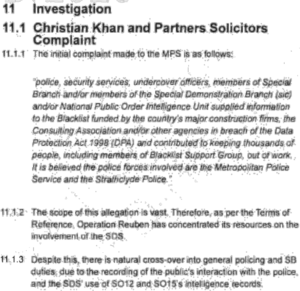
Furthermore, establishing Operation Reuben within Herne meant the opportunity of a wider inquiry into the investigation into the allegation of police collusion in blacklisting was lost. Not least because it meant the focus was less on Special Branch as a whole, but on the narrow question of whether the Special Demonstration Squad was the source of information in The Consulting Association’s blacklist files, something that downplayed wider links between Special Branch and industry bodies.
Set up in February 2013, initially the operation was supervised by the Independent Police Complaints Commission, but in May that year it was downgraded to a local police investigation.
The Operation Reuben Report
The final report in Op. Reuben was completed on 14 February 2016. In 2018, it was released by the police to the solicitors representing the Blacklist Support Group in a partially redacted form. Though thin on detail, the report sheds further light on aspects of Special Branch interactions with private firms and its role in political vetting.
Methodology
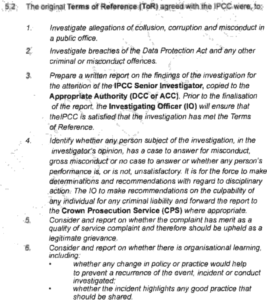
Operation Reuben is not a comprehensive investigation of the blacklisting files and links to the SDS. It took a sample of only twenty out of the more than three thousand names to look at, less than 0.5% of the total list. Twelve names came from the Information Commissioner who had highlighted them as of particular interest. Eight others were a random sample.
The operation also looked at specific allegations made in the Blacklist Support Group complaint, including in relation to SDS undercover Mark Jenner. It also examined related statements made by whistleblower Peter Francis regarding his reporting on some of the blacklisted activists.
Additionally, the investigation made a cursory examination of wider breaches of data protection law, by simply asking regional forces to send in details of officers disciplined for this offence.
Findings
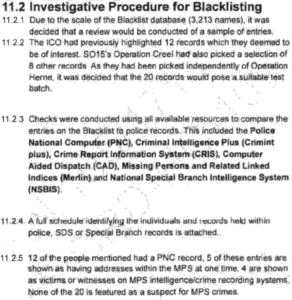
The complaint from the Blacklist Support Group made a number of specific claims about individuals’ files that had been seized from The Consulting Association, asserting that some of the material discovered could only have come from the police. In each of these cases, the Report concludes that the allegations were ‘not proven’, mainly on grounds that the investigating officers thought the information could just have easily come from other sources such as private investigators or informers within the trade unions. We address two of these cases, the Frank Smith / Lisa Teuscher files and the Cenotaph incident in greater detail below and demonstrate that there is considerable deficiencies in the drawing of these conclusions.
Reuben also found that the allegation made by David Clancy, a senior investigator in the Information Commissioner’s Office that ‘the information was so specific and contained in effect operational information that would not have formed anything other than a police record’[13]Daniel Boffey, Police are linked to blacklist of construction workers, The Observer, 3 March 2012. was not proven. Again, as we argue below, this is not well sustained by the Report itself.
The Report does however concede that the police including Special Branches had likely supplied information to blacklisting organisations though no specific examples are given. This despite various protocols or standing orders being in place within Special Branch explicitly prohibiting sharing information with outside entities. These protocols are not set out and their existence is only known because the report notes that Special Branches had to recirculate reminders of them in light of breaches having come to light.
More specifically, Op. Reuben concluded that because of the secretive nature of the SDS, it was unlikely the undercovers were directly involved in the passing of information on to blacklisting organisations. However, once information from the unit had been assimilated into Special Branch files, unauthorised passing on of materials from those files may have been passed on.
According to the Report, while undercover, Jenner reported on 300 people, most of which were just mentions of their presence at events. Of those reported on in more detail, 16 names were also to be found on the Blacklist. Nevertheless, the authors of the Op. Reuben report said that the information in their blacklist files was not necessarily provided by Jenner, and again, could instead have come from other sources.
It is also worth highlighting the following passage from the Report’s conclusions, which reveals an important source of information, an address book, that apparently has not been looked at in detail:
|
It is recommended that further investigation should take place to establish the scale of the ‘information sharing’, utilising the information supplied by [redacted] address book, which contains detail of just under 100 people from 23 different policing areas around the UK. Amongst those names are 9 officers linked to the MPS, and it is believed that the MPS may wish to speak to these officers further. |
Specific complaints
The Blacklist Support Group complaint named two specific issues as highlighting material in The Consulting Association files which could only have come from police. In both cases Operation Reuben said this was ‘not proven’.
Both these cases are dealt with in Dave Smith and Phil Chamberlain’s book Blacklisted, which cover them from the perspective of what was learned from The Consulting Association files.[14]Dave Smith & Phil Chamberlain, Blacklisted: The secret war between big business and union activists, New Internationalist, 2nd Edition, September 2016. The Operation Reuben report sheds a small bit of light on the police side of things.
Frank Smith and Lisa Teuscher
Frank Smith was a bricklayer and socialist in London who was politically involved in Militant Labour, Youth Against Racism in Europe (YRE) and anti-fascist campaigning. He was also an active trade unionist. Throughout the late 1990s he was in a relationship with an American woman, Lisa Teuscher, who was also active with YRE though not involved in the construction industry.
Both organisations were targeted by SDS undercover Peter Francis, who at one point was secretary of the YRE Hackney Branch and who regularly went drinking with Smith.
In 2013, Peter Francis, having turned whistleblower, told The Guardian there was a Special Branch file on the pair and that he had been responsible for starting Frank’s file. He also revealed that Lisa had a file opened on her as she was said to be an important member of YRE. Around this time, an effort was made to deport Lisa, leading to her passport being seized for seven years, apparently at the intervention of the Home Office. Francis recalled being asked by his superiors to supply information to the Home Office on her marital status. She eventually won her fight, though the effort that took proved too much and she returned to the US to be reunited with her family there.
Frank and Lisa were also subject of files compiled by The Consulting Association. Frank’s TCA file starts in 1992 due to his involvement in trade union strikes. It also mentions that he was in a relationship with Lisa, and falsely stated she was involved in ‘several marriages of convenience’. Lisa’s blacklist file was one line describing her as ‘girlfriend of Frank Smith’.[15]Dave Smith & Phil Chamberlain, Blacklisted: The secret war between big business and union activists, New Internationalist, 2nd Edition, September 2016.
In Operation Reuben, a significant section of the investigation into this case is redacted. The first unredacted note is para. 11.4.13, but from there the case as set out by Reuben is worth reading in its entirety.
From the above, Operation Reuben contacted at least two people in relation to the files on Frank and Lisa. The first (in para. 11.4.21) was a serving officer in 2014 and states that meetings were held at which the TCA were possibly present. The implication of the last sentence in that paragraph is that personal material was being shared at such meetings per se – something the Op. Reuben investigators do not seem to have followed up on.
The second individual contacted (referred to in 11.4.25) is probably the same person referred to in 11.4.27 where they are named as a source for some of the material in The Consulting Association files on Frank Smith. The author of the Report notes that this person was said to have had direct links with local Special Branches. While the individual provided a statement to Reuben, it is not clear they were actually interviewed, and it is not clear why this link with Special Branch was not followed up.
They are most likely Gayle Burton, the former head of Human Resources of blacklisting firm Costain, who appears as a source in the TCA file on Frank Smith[16]Tom Coburg, The links between Costain & the Consulting Association (blacklisters), UndercoverInfo (blog), 3 July 2016. and was named in the Scottish Parliament as having Special Branch links.[17]Neil Findlay, MSP, Undercover Policing – in the Scottish Parliament on 30th June 2016. , TheyWorkForYou.com, 30 June 2016.
Paras. 11.4.27 and 28 raises further questions over the Op. Reuben approach to the investigation. It states that though Francis claimed responsibility for some of the reporting on Frank Smith, Reuben is focused on the lack of corroborating reports to support this. It ignores the fact that Francis was at the time a YRE branch secretary and also regularly drank with Smith, hence in a good position to know these details.
Much of the discussion around dates of files are red herrings, as is to a degree, whether or not Peter Francis is the original source of the Special Branch material. The actual question is who would have known of Lisa and Frank’s relationships and the allegations around Lisa’s marital status, and why it would have been of interest to The Consulting Association. The latter’s interest in Lisa is minimal and solely in light of her relationship with Frank. Rather, it was Special Branch that opened a file and had an interest in her relationship with Frank. Furthermore, the simple spelling mistake in the TCA file of ‘marriages’ rather than marriage, speaks of information being passed on and noted erroneously, rather than acquired themselves.
The key points however, are that the information was circulating within Special Branch, not just the SDS; and that there were possible routes to The Consulting Association attested to, even if the specifics are not recalled.
The corollary then is whether the information on Frank and Lisa personal life could have reached TCA through other means. What Reuben’s authors ask us to believe, is that all possible routes are somehow equivalent. That this is material that was just as likely and somehow ‘open source’, or something a construction industry manager or even an informer would pass on. They do not address at all that the information is in terms that reflect the interests of Special Branch.
While TCA did use other sources, it is clear that the Reuben investigators have a particular source is in mind, who we have provisionally identified above. There is clear necessity to explore their role in further depth not least because of the stated Special Branch link. Indeed, there is the related question of why TCA would use these other routes to acquire knowledge Lisa’s existence at all, let alone the ‘marriages of convenience’. Added to this is that Lisa’s involvement was through the YRE, not the construction industry and knowledge of her was very unlikely to be known to building firm managers – a key source of intelligence for the TCA.
Rather, the breath of the material in Frank Smith’s TCA file alone speaks of an origin from those who are interested in each different aspect of his activism and personal life as well as his trade union campaigning. In the absence of any viable alternative suggestion, the front runner by far for the source of that material is the organisation with a demonstrable interest in all of it including Lisa Teuscher – Special Branch.
In light of this, the Report is demonstrably an investigation that stops at the point where it would be able to demonstrate that material from the undercover police was being placed into files being passed onto the blacklisting firms. Thus, on this particular issue the finding of ‘not proven’, is missing the crucial clause ‘but very probably the case’.
There is another aspect of Frank Smith’s TCA file that is not addressed at all by the Operation Reuben report. His file states: ‘under constant watch (officially)’.[18] Dave Smith & Phil Chamberlain, On the blacklist: how did the UK’s top building firms get secret information on their workers? , The Guardian, 27 February 2015. Who else but police or related agencies would be able to say that he was being formally observed? Given it is clear from the Reuben report that he was a target of Special Branch attention at the time, something corroborated by Francis, one of those involved in that targeting.
Cenotaph incident
The second of the two incidents raised by the Blacklist Support Campaign refers to three anti-fascist protestors from the YRE, including Frank Smith, who were stopped and searched by police in 1999. It is known as the Cenotaph incident as they were on their way to demonstrate against the British National Party laying a wreath there as part of Remembrance Sunday. The three were stopped by a uniformed police constable at nearby Charles Street. A report of this was passed onto Special Branch and logged under YRE, and the Extreme Left Wing desk (part of ‘C Desk’) within MPSB notified.
The stop and search was a brief incident and not a matter of public record, particularly as they were not arrested. Of the three, one Steve Hedley, was targeted by SDS undercover ‘Mark Cassidy'[19]Peter Salmon & Eveline Lubbers, Mark Jenner (profile), Undercover Research Group (powerbase.info), 2014-2016. who was also infiltrating construction workers, including another leading campaigner who was extensively blacklisted, Brian Higgins.
According to Op. Reuben, the material was not held in the Special Branch personal files of the three or among SDS files, but was found in the file on the YRE Away Team. However, the TCA files on the three individuals noted the incident, citing a construction company as the source. Since Hedley worked for the railways, while the third individual, Dan Gilman, was a teacher, it is not clear why a construction industry manager would have that kind of specific information.
The Operation Reuben investigation into this complaint is confusing and seems to deliberately misconstrue the case.
There is an obvious immediate mistake in the final paragraph (11.5.10): The Guardian article referred to[20]Rob Evans,Police ‘spied on activists for blacklisting agency’ , The Guardian, 18 August 2013. does not state that knowledge of the Away Team’s existence was a carefully guarded secret. This is compounded by the misconception that knowledge of the existence of the ‘Away Team’ within the YRE is not the same as knowledge of its members. The reference to a World in Action programme is presumably the November 1993 documentary on the Welling riots, which does name the Away Team, but does not identify its membership.[21]World In Action – Violence With Violence, Granada TV, November 1993 (accessed via YouTube.com). Actual membership of the group was a carefully guarded fact, albeit one that found its way into police files via Francis. No explanation is given how construction industry managers would have learned of that membership.
A careful reading of section 11.5 of the Report indicates that a focus on Peter Francis is used as a smokescreen. The statement that ‘there is a gap of over two years’ between the end of Francis’ deployment and the appearance of information in the TCA is used to imply he is not speaking the truth. What it does not address is that the files may have been passed over after Francis’ deployment. Nor that Francis stayed on at the SDS after his deployment and was privy to much of the intelligence and inner workings of the unit.
Whether or not Francis being the source of the information that the individuals were members of the YRE Away Team is actually a secondary point. Focusing on it distracts from the more significant issue, the knowledge of the Cenotaph incident itself.
Likewise, in focusing on the undercover officer, Op. Reuben brushes over the question of how TCA got access to the details of the Cenotaph incident, something not apparently explored. If there is material in The Consulting Association files that could only have come from the police, as the Information Commissioner’s Office investigator David Clancy said, then this fact is among it.
Francis’ detail on Frank’s activity with the YRE Away Team is important, because it shows the amount of detail which TCA acquired, indicating that Special Branch were the most likely source of the material (via a liaison with a construction company).
Operation Reuben concluded that the allegation was not proven, but a more accurate statement would be that it was highly likely to have been the case.
Read the Operation Reuben report (external link).
References
| ↑1 | Phil Chamberlain, Enemy at the gates, The Guardian, 28 June 2008. |
|---|---|
| ↑2 | Matthew Taylor, Blacklist used by construction firms to disrupt environmental protests, The Guardian, 28 January 2013. |
| ↑3 | Construction firms strike blacklisting settlement, BBC Online, 29 April 2019. |
| ↑4 | Alan Jones, Blacklisted construction workers get compensation, The Independent, 9 May 2019. |
| ↑5 | In the year leading up to the second world war, MI5 was secretly vetting 25,000 workers a month. However, this was not aimed at Nazi sympathisers but working class communists. The National Archives, Cabinet Office 116/37, Lord Swinton to Service Supply Departments, July 10, 1940, cited in Jennifer Luff, Covert and Overt Operations: Interwar Political Policing in the United States and the United Kingdom, June 2017. |
| ↑6 | Mark Hollingsworth & Richard Norton-Taylor, Blacklist: The inside story of political vetting, Hogart Press, 1988. |
| ↑7 | Eveline Lubbers, True Spies – Story, SpecialBranchFiles.uk, 24 March 2016. Links to video and transcripts of the TV series. |
| ↑8 | Peter Salmon & Eveline Lubbers, Mark Jenner (profile), Undercover Research Group (powerbase.info), 2014-2016. |
| ↑9 | Dave Smith & Phil Chamberlain, Blacklisted: The secret war between big business and union activists, New Internationalist, 2nd Edition, September 2016. |
| ↑10 | Will Hurst, Police dismiss claims of blacklist collusion, Building, 1 February 2013. |
| ↑11 | Met police launch inquiry into construction worker blacklisting, The UK Construction Blog, 25 February 2013. |
| ↑12 | Spycops Investigator was Spycops Overseer, Campaign Opposing Police Surveillance, 31 May 2016. |
| ↑13 | Daniel Boffey, Police are linked to blacklist of construction workers, The Observer, 3 March 2012. |
| ↑14, ↑15 | Dave Smith & Phil Chamberlain, Blacklisted: The secret war between big business and union activists, New Internationalist, 2nd Edition, September 2016. |
| ↑16 | Tom Coburg, The links between Costain & the Consulting Association (blacklisters), UndercoverInfo (blog), 3 July 2016. |
| ↑17 | Neil Findlay, MSP, Undercover Policing – in the Scottish Parliament on 30th June 2016. , TheyWorkForYou.com, 30 June 2016. |
| ↑18 | Dave Smith & Phil Chamberlain, On the blacklist: how did the UK’s top building firms get secret information on their workers? , The Guardian, 27 February 2015. |
| ↑19 | Peter Salmon & Eveline Lubbers, Mark Jenner (profile), Undercover Research Group (powerbase.info), 2014-2016. |
| ↑20 | Rob Evans,Police ‘spied on activists for blacklisting agency’ , The Guardian, 18 August 2013. |
| ↑21 | World In Action – Violence With Violence, Granada TV, November 1993 (accessed via YouTube.com). |